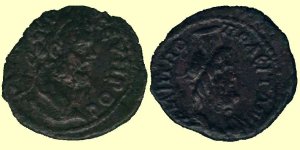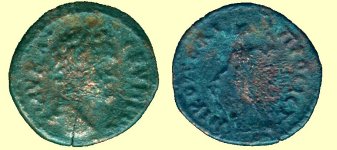
Septimius Severus 193 - 211 A.D.
By clicking on the pictures you'll be linked to a more complete description of the coin. At the bottom of this page there is a more elaborate biography of the emperor.
 |
Obverse: AV KA C CEVHPOC |
| Reverse: ΦIΛIππOπOΛEITΩN | |
|
Fieldmarks: -
|
|
| Exergue: - |
 |
Obverse: AV kA CEVHPOC |
| Reverse: NIKOπOΛIπPOCICT | |
|
Fieldmarks: -
|
|
| Exergue: - |
Septimius Severus 193 - 211 A.D.
Civil war however wasn't over yet. Another
provincial governor from Syria, Pescennius Niger, had also been declared Augustus
by his troops. And the eastern provinces quickly went under his authority. Byzantium
became Niger's base of operations as he prepared to fight the armies of the
west loyal to Severus. Early January 194, Niger was defeated in a battle near
Nicaea
and fled south. Asia
Minor and Bithynia (northern part of Turkey) fell under Severus' control,
and soon after this Egypt
recognized Severus' authority. By late spring, Niger was defeated again near
Issus
and the remainder of his support collapsed. Syria
was quickly pacified and Niger was killed fleeing Antioch
(more info on
Antioch). Byzantium, however, refused to surrender to Severan forces. Niger's
head was sent to the city to persuade the besieged citizens to give up, but
to no avail. The Byzantines held out for another year before they surrendered,
as punishment for their stubbornness, the walls of their city were destroyed.
In the meanwhile Severus pursued and executed Niger's followers and used their
wealth to strengthen his finances. Severus also took steps to cement his
legitimacy as emperor, he shocked the Senate by proclaiming himself the son
of Marcus Aurelius and by restoring the memory of Commodus, now his brother,
which allowed him to trace his authority, through adoption, back to the emperor
Nerva. Bassianus, the emperor's elder son, was renamed Marcus Aurelius Antoninus
(Caracalla). Severus is usually depicted with
a long beard (see portrait on the coin) to resemble Marcus Aurelius. This was
pure propaganda because ancient sources report he actually wore his beard neatly
trimmed.
In 195, Severus betrayed his ally Clodius
Albinus he declared him a public enemy and appointed his eldest son Caesar instead
of Albinus. During the struggles between Severus and Niger, Albinus had remained
in Britain as governor. Although Albinus had not attempted open revolt against
the emperor, he seems to have been in communication with senators about future
moves (in other words plotting against Severus). Clodius Albinus responded to
the actions of Severus by proclaiming himself emperor and invading Gaul.
In 197 after a Severan victory at Tournus,
Albinus found himself and his army trapped near Lugdunum
(Lyon). A battle broke out on the 19th of February, in the initial fighting,
Albinus' troops forced the Severans into retreat and during this retreat Severus
fell off his horse and was almost killed. However the Severan cavalry appeared
just in time and Albinus' army was routed. Lugdunum was sacked and Albinus,
who was trapped in a house along the river Rhône,
committed suicide. Severus ordered Albinus' head to be cut off and sent to Rome
for display and many of Albinus' supporters were killed. Albinus' wife and children
were killed, as were many of the wives of his supporters. Tradition also tells
us of the mutilation of bodies and denial of proper burial. The emperor had
revealed a tendency for cruelty that troubled even his most fervent supporters.
A purge of the senate soon followed.
After defeating Albinus Severus began
a campaign to settle things on the eastern frontier (In 197 Nisibis
had once again been under siege). Several victories in Mesopotamia were followed
by tours of eastern provinces, including Egypt. Several years of celebrations
and showing off followed. In Rome an arch,
still standing today, was dedicated to the emperor at the western end of
the Forum. Preparations were also being made for the Secular Games, which were
thought to have originated in earliest Rome and which were to be held every
110 years. Augustus celebrated the Secular Games in 17 BC, and Domitian in AD
88, six years too early. (Claudius used the excuse of Rome's 800th year to hold
the games in AD 47.) In 204 Severus would preside over ten days of ceremonies
and spectacles.
The order Severus was able to impose on
the empire through both the force of arms and the force of law failed to extend
to his own family. His now teenage sons, Caracalla
and Geta, displayed a reckless sibling rivalry that sometimes resulted in physical
injury. The emperor believed the lack of responsibilities and lazy life in Rome
contributed to the ill-will between his sons and decided that the family would
travel to Britain to oversee military operations there against the wild and
unruly Scots
who were harassing the civilized towns of Roman Britain. Caracalla
was involved in directing the army's campaigns, while Geta was given civilian
authority and a promotion to joint emperor with his father and brother. Severus
was now well into his 60s and chronic gout limited his activities and sapped
his strength. The emperor's health continued to deteriorate in Britain, and
he became ever more intent on trying to improve the bitter relationship between
his two sons. Shortly before his death on the 4th of February 211 at Eboracum
(York), a Roman outpost far from the civilized center of the empire, Severus
advised his sons, "Agree with each other, give money to the soldiers and
scorn all other men." It was to no avail, upon his death, the rivalry between
Caracalla and Geta became public, the two emperors lived in separate palaces
and each had their own guard. Somewhere during December 211, Caracalla
convinced their mother to call Geta for a reconciliation meeting in her residence.
It was a trick, in his mother's house Caracalla's soldiers attacked Geta and
he died in his mother's arms, she was not allowed to mourn for her killed son.
A massacre of Geta's supporters followed, and Cassius
Dio (a historian) tells us that some 20,000 people were killed.
Severus died at the age of 65, his reign
lasted nearly 18 years, a duration that would not be matched until Diocletian.
The reforms he enacted would eventually alter the very character of Roman government.
His pay increases to the army (nearly 50%) established a trend that placed a
severe burden on the Roman state. Future emperor's were expected to follow suite
and increase pay as well. The cost of these pay rises resulted in ever increasing
taxation that damaged the economy. Some historians believe the high taxes, initiated
by Severus' policies, played a significant role in Rome's long-term decline.
For this biography I've used the texts from the following websites:
http://www.imperiumromanum.com/
http://www.roman-emperors.org/
http://www.roman-empire.net/
And from: Gibbon's Decline and fall of the Roman empire.